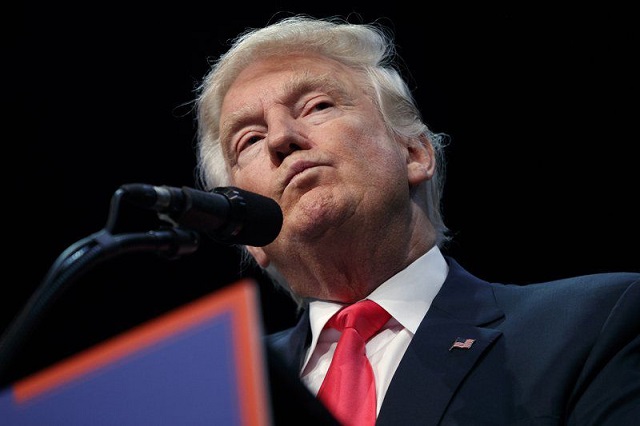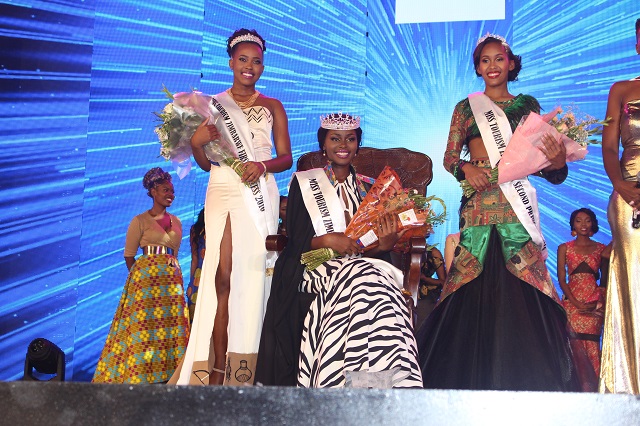Trump victory: Possible implications for Africa

Ronald Chipaike
THE victory of Donald Trump in the race for the White House will go down as the most surprising electoral upsets in the USA’s political history.
Having been endorsed by a few notable individuals, organisations and media houses and with public opinion polls predicting a Clinton victory, a few expected the republican candidate to win.
However, on the 8th of November Trump won 276 of the Electoral College vote that would take him to the White House.
Trump’s electoral campaign in the past 18 months was littered with controversies. His attack on the immigration of especially Muslims into the USA, his criticism of US-China trade relations, his suggestion that he would build a wall on the US-Mexican border to stem the flow of Mexicans into the USA (which could have cost him the Latino vote) as well as praise of the Russian president/government are some of the important issues that threatened to derail Trump’s march to the White House.
His alleged “chauvinistic” views of women as well as alleged abuse of female counterparts were all issues that had the potential to cost him the presidential seat. However, despite these odds, Trump managed to leverage partly on the growing right wing sentiment in the USA to win the presidential race.
While a lot will be said in the coming days and weeks about Trump’s victory, this opinion piece seeks to analyse what a possible Trump Africa policy would be like when he starts his term in 2017. It should be acknowledged at this early stage that Donald Trump, at some occasions, has shown his negative perception of Africa.
During one of his campaign meetings in Indianapolis in 2015, Trump is cited as having stated that (some) Africans are lazy and are only good at having sex, eating and theft. He continued by stating that most African countries need to be recolonised again for another 100 hundred years because they know nothing about leadership and self-governance.
Such racist remarks have been interpreted to mean that Donald Trump’s Africa policy will be characterised by disengagement as well as xenophobia. But will his Africa policy be guided by such negative rhetoric and sentiments? Is his Africa policy going to be any different from Obama’s “not so active engagement policy”?
My conviction is that realpolitik, rather than emotional and misguided statements, is going to play a major role in the Trump administration’s dealing with African issues.
A few highlights of US-Africa Policy from 2000
Since 9/11, that is, from the days of George Bush junior, the USA’s Africa policy has been premised on fighting terrorism in West and East Africa as well as in the Sahel and Maghreb regions. This has seen the activation of the Africa Command to deal with US foreign security threats in Africa.
The USA has also played an important role assisting Uganda to fight against Joseph Kony’s Lord Resistance Army. Another anchor of the US foreign policy, has been the promotion of private sector led economic growth in different sub Saharan African countries through such “soft power” initiatives as the Africa Growth and Opportunity Act (AGOA)-which was introduced during the Bill Clinton presidency, the Millennium Challenge Corporation (MCC) as well as the Power Africa initiative which has the objective of connecting a significant number of African households to electricity.
The Africa Growth and Opportunity Act was passed by US Congress in 2000 to give eligible sub-Saharan African countries access to the US market for selected products duty and quota free subject to an annual approval by the US President. At the moment, 39 African countries, who have been able to fulfill the eligibility conditions for AGOA are benefiting from AGOA market access.
The conditions include, among others, respect for the rule of law and upholding of labour and human rights as well as comprehensive policies on combating corruption. A country seeking eligibility must also not embark on policies or harbour individuals and organisations that may harm the US’ economic and security interests. For eligible countries, AGOA benefits were extended for another 10 years in 2015.
Another element of the US’s Africa policy is the Millennium Challenge Corporation which was established by the US congress in 2004. The MCC provides development assistance for private sector development in Africa, especially to those countries that are making deliberate efforts to invest in their people and are ruling justly.
Through its compacts in partner countries, the MCC has invested $1.5 billion to support “Power Africa” in bringing electricity to sub Saharan African homes. The Power Africa Initiative was launched by President Obama in 2013 and was based on the realisation that two out of every three people in sub-Saharan Africa do not have access to electricity. Another linchpin of US Africa policy is the President’s Emergence Plan for AIDS Relief (PEPFAR) launched by the Bush Administration around 2003 with the objective of addressing the global HIV/Aids pandemic. In Africa, by 2008, the programme had ensured access to Anti-Retroviral Treatment for 1.2 million people.
Lastly, among some of the notable hallmarks of US-Africa policy was the introduction by the Bush administration of the US-Africa Command in 2007. The main objectives of AFRICOM at its inception were to promote US national security interests in Africa and its surrounding waters.
This has been done through improving African countries defence capabilities, especially in the face of terrorist threats in Central, West, North and East Africa. In this connection, Africom became an instrument in Bush’s Global War on Terrorism which was introduced soon after the 9/11 attacks. Based in Stuttgart, Germany, African countries have been hesitant to host Africom basing their fears on the possible militarisation of American foreign policy in Africa using them as springboards. There are also the obvious fears of neocolonial and imperial domination through Africom. This is what has added to the controversies surrounding the whole initiative and not only Africom’s attempt to establish a permanent presence in the continent.
US-Africa Policy under Donald Trump
While it is difficult to proffer a comprehensive prediction of what the US foreign policy towards Africa may include from 2017, a few issues can be highlighted.
An analysis of US foreign policy in Africa from 2000 shows that it is mainly the ideas of George Bush that have loomed large even under Obama’s presidency. Obama merely extended George Bush’s foreign policy, introducing a few elements, among them, the Power Africa initiative as well as his intensive use of drones to target militants in Somalia and other parts of the continent in the fight against terrorism.
Indeed Obama has been criticised for not actively engaging with Africa as widely expected when he got into office. However, the point that is missed by his critics is that since the end of the cold war, the USA has not been very active in Africa owing to the fact that the continent’s strategic value has declined. Because of this decline, only one issue, in my opinion, remains important in US Africa policy.
The major issue, which Obama prioritised and probably will also be prioritised by Trump is the fight against terrorism in the continent. With the use of unmanned aerial vehicles, also known as drones, the USA has a smart way (rather than having boots on the ground) of preempting militant activities in the continent before they become active threats to US interests in Africa as well as in the US homeland itself. Even under Trump, I think this approach together with the funding and training of selected African militaries, will continue as part of the US policy in the continent.
The other issue that could have been important, had it not been for the new technologies and new finds/discoveries in the USA, is oil. However, due to the Shale oil boom, US oil imports from Africa are down by 90 per cent since 2010. The Shale oil boom has increased US production from 5 million barrels per day in 2008 to more than 8 million. By 2019, production is predicted to rise to 9.6 million barrels per day.
According to oil experts, almost all of the new US oil is light sweet crude-which is the same kind US refineries used to import from West Africa. Even Venezuela, which is itself a major oil producer is now importing oil from the USA. One African state which has been affected by this shift is Nigeria. The country has seen its exports to the US decline the most, from more than a million barrels per day in 2011 to about 38 000 as of February 2014.
Thus, in the absence of significant demand for oil from the USA, African oil economies will depend more on Chinese demand for the commodity as the Asian giant became a net oil importer in 1993. Concomitantly, we may see a US-Africa policy that is mainly tilted towards security and defense issues compared to oil and other commodities. If oil was (still) a major factor in the USA’s Africa policy, it might have been the symbol of strategic competition in the continent between the USA and China in the Trump era. In that case Africa could have had some significance in US policy as well as some agency, as a result.
On the issues of human rights, rule of law and funding for humanitarian crises, the USA may not change its position drastically, although owing to Trump’s isolationist stance, some budgets may be reduced. Such initiatives such as the MCC, AGOA, PEPFAR and their conditions for eligibility (in the case of the MCC AND AGOA) will not be radically changed. For countries such as Zimbabwe that have been put under sanctions for alleged human rights, election violence and rigging as well as rule of law infringements, nothing will change. In fact, since the Zimbabwe Democracy and Economic Recovery Act (ZDERA) was put in place in 2001 under the republican presidency of the Bush administration, no quick changes will be expected from another republican president. In short, Zimbabwe may not be a foreign policy priority for the Trump administration.
Finally, the issue of climate change has been topical and concerns have been raised about Trump’s views on Climate Change. He is cited as having said that Climate Change is not real and that it is a hoax perpetrated by the Chinese.
He is also cited as having said even if it existed, Climate Change is not caused by anthropogenic or human activities. As a result he proposes the dismantling of the Paris Agreement on Climate Change which is viewed as having reached major milestones on green-house gas emission reduction commitments in order to reduce the effects of global warming as well as on funding support commitments from developed countries.
Basing on this rhetoric, it can be predicted that Trump’s policy on Climate Change will negatively affect African countries who are supposed to benefit from funding from developed countries for Climate Change adaptation. However, basing on the advice he is going to get, it is too early to judge on what course of action the Trump administration will take on the issue of Climate Change.
In summary, Trump’s Africa policy is not going to be very different from Obama’s Africa policy. In fact, as a result of his avowed isolationist stance, it can be said that (mainly) security interests will continue as the leading light of US-Africa policy while economic and humanitarian issues will play a secondary role. In short, Africa will not be a top priority for the US in the short to medium term.
Ronald Chipaike teaches international relations at Bindura University of Science Education. He researches on African agency in international relations as well as Africa’s engagements with emerging powers. [email protected]












Comments